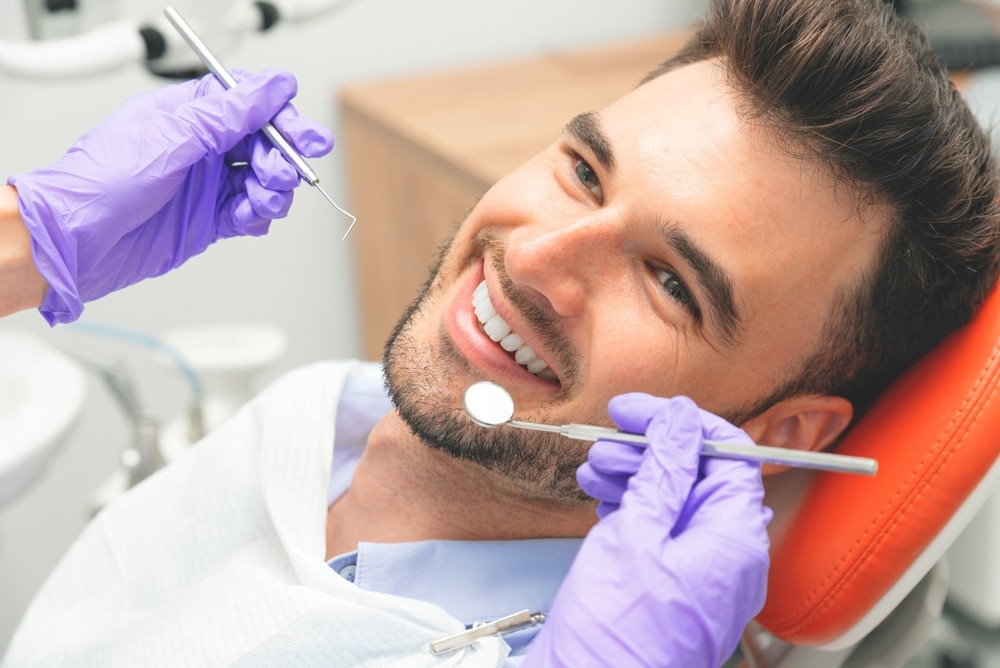You know you have more than just teeth in your mouth – shouldn't your dentist?
A traditional dentist's primary concern is the health of your dentition (your teeth). On the other hand, neuromuscular dentists focus on your total health. This includes your teeth and how they fit together (occlusion), as well as your bones, joints, muscles, tendons, and nerves.

Drs. Ken and Marnie Collins have spent decades developing their skills and are committed to staying current on the latest techniques – including neuromuscular dentistry. Through comprehensive dental services, they strive to treat the whole patient, addressing the source of their symptoms and helping them see long-term results.
What Is Neuromuscular Dentistry?
Neuromuscular dentistry is a practice focusing on the relationship between the teeth, jaw joints, and the muscles that control jaw movement.
The jaw, muscles, and nervous system work together to control movement, maintain alignment, and enable functions like chewing and speaking. When the jaw is misaligned, it can strain the nearby muscles and nerves. This causes pain, tension, and other symptoms throughout the head, neck, and shoulders.
By analyzing jaw position, muscle activity, and bite function, this approach aims to identify the root cause of issues like temporomandibular joint disorder (TMJ/TMD), jaw pain, headaches, and facial tension.
Conditions Treated with Neuromuscular Dentistry
Neuromuscular dentistry addresses conditions caused by an imbalanced bite and jaw misalignment. Commonly treated issues include:
- Temporomandibular joint disorder, which may cause jaw pain, clicking, and limited movement.
- Chronic headaches, facial pain, neck or shoulder tension, and earaches.
- Teeth grinding (bruxism) and difficulty chewing.
- Sleep issues such as snoring or mild obstructive sleep apnea.
Neuromuscular Dentistry Benefits

By evaluating the position of the jaw and the function of the surrounding muscles, the neuromuscular dentistry approach targets the root of your discomfort rather than just managing symptoms. This leads to longer-lasting relief and improved function.
Say you crack a tooth. A traditional dentist may want to just put a dental crown on it. Conversely, a neuromuscular dentist will ask, "Why did that tooth crack?" and identify the specific bite imbalance that affected the crown.
This approach is especially important when using porcelain veneers to restore worn, chipped, or cracked front teeth. Under normal conditions, porcelain veneers are highly durable and will last decades. A bad bite will destroy them, though.
A neuromuscular dentist will also examine a dental restoration's impact on your current bite. They will never give you a poorly fitting crown or filling that will cause long-term discomfort.
Signs You May Need Neuromuscular Dental Care
You may benefit from neuromuscular dental care if you experience frequent jaw pain, stiffness, or popping sounds when opening and closing your mouth. Other indicators include:
- Chronic headaches, migraines, neck or shoulder pain, and facial soreness – especially upon waking.
- Difficulty chewing, locking of the jaw, and uneven tooth wear.
- Earaches, ringing in the ears, or dizziness without a clear cause.
- Numbness or tingling in the fingers.
These symptoms often stem from strain on the jaw joints and surrounding muscles. A neuromuscular dentist can assess your bite and jaw function to determine whether treatment can help relieve your discomfort.
What to Expect During Your Evaluation
During your neuromuscular dentistry evaluation at Collins Dentistry & Aesthetics, the team will assess your jaw alignment, muscle function, and bite.
Drs. Ken & Marnie Collins use a K7 computer evaluation system, which outputs invaluable clinical data on your current bite alignment. They will then begin treatment with a transcutaneous electrical nerve stimulation (TENS) machine.
TENS electronically massages the muscles in your jaw. Many patients report an immediate improvement in their TMJ symptoms, including pain, after this treatment.
You'll also discuss your symptoms, medical history, and chronic issues like jaw pain or headaches. The goal is to pinpoint the source of discomfort and determine whether misalignment contributes to your condition.
Based on the findings, the doctors will recommend a customized treatment approach to restore balance, comfort, and improved jaw function.
Neuromuscular Dentistry Services at Collins Dentistry & Aesthetics
Drs. Ken & Marnie Collins will resolve your neuromuscular problem with one or a combination of the following:
- Coronoplasty: This is a conservative procedure that reshapes the biting surfaces of the teeth to improve how they come together. It's often used to correct minor bite imbalances.
- Neuromuscular Orthotics: These are custom-made appliances worn on the teeth to gently reposition the jaw into a more relaxed, balanced position.
- Full Mouth Reconstruction: This involves restoring or rebuilding all the teeth in the upper and lower arches to achieve a healthier bite and improved function.
Why Choose Collins Dentistry & Aesthetics?
Patients choose Collins Dentistry & Aesthetics for the experience, precision, and compassion that Drs. Ken and Marnie Collins bring to every appointment. With over 25 years of service in Spokane, this husband-and-wife team blends advanced training with a personal approach to care.
Both earned their DDS degrees from Creighton University and have completed extensive continuing education through the Las Vegas Institute, including neuromuscular and TMJ dentistry. Recognized as Spokane's Best Dentist/Cosmetic Dentist for six years running, they combine clinical skill with genuine connection.
Schedule Your First Treatment Today
If you've suffered from bite issues for any length of time and recognize that it is time for a change, contact Collins Dentistry & Aesthetics today.
Call our South Hill office at 509-532-1111 or our Spokane Valley practice at 509-927-2273. Drs. Ken & Marnie Collins will help you with your pain and give you a great-looking smile at the same time!



